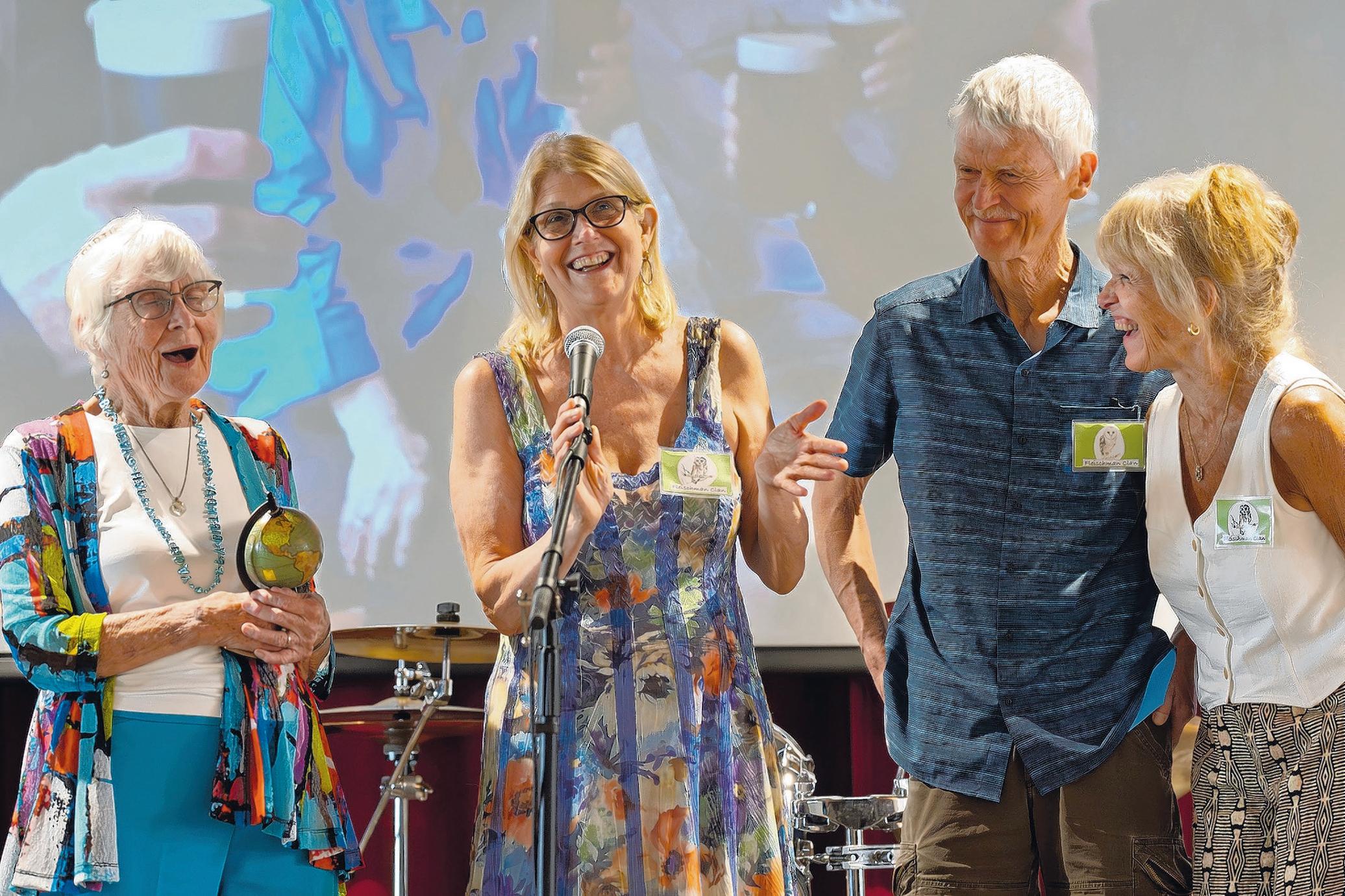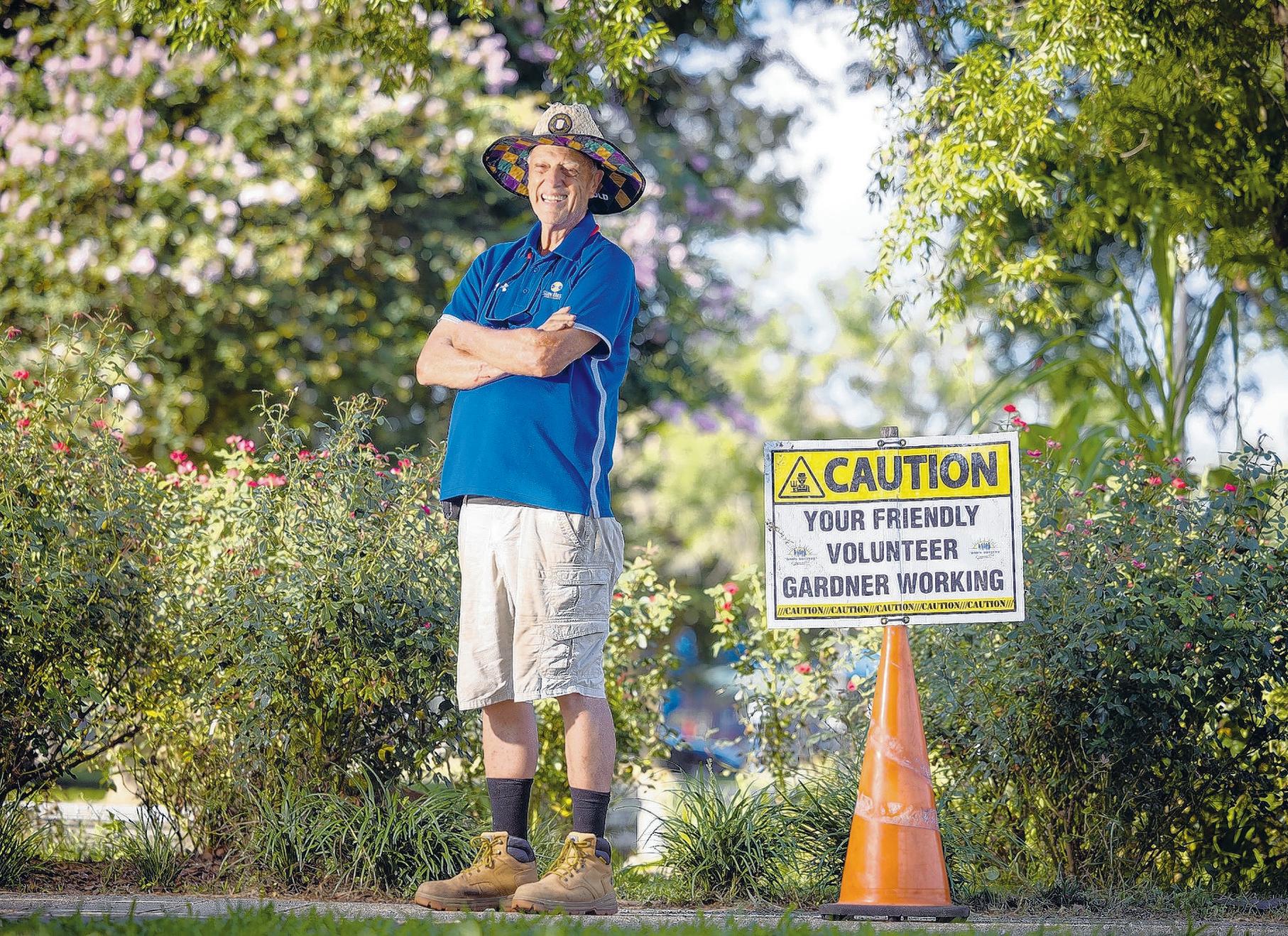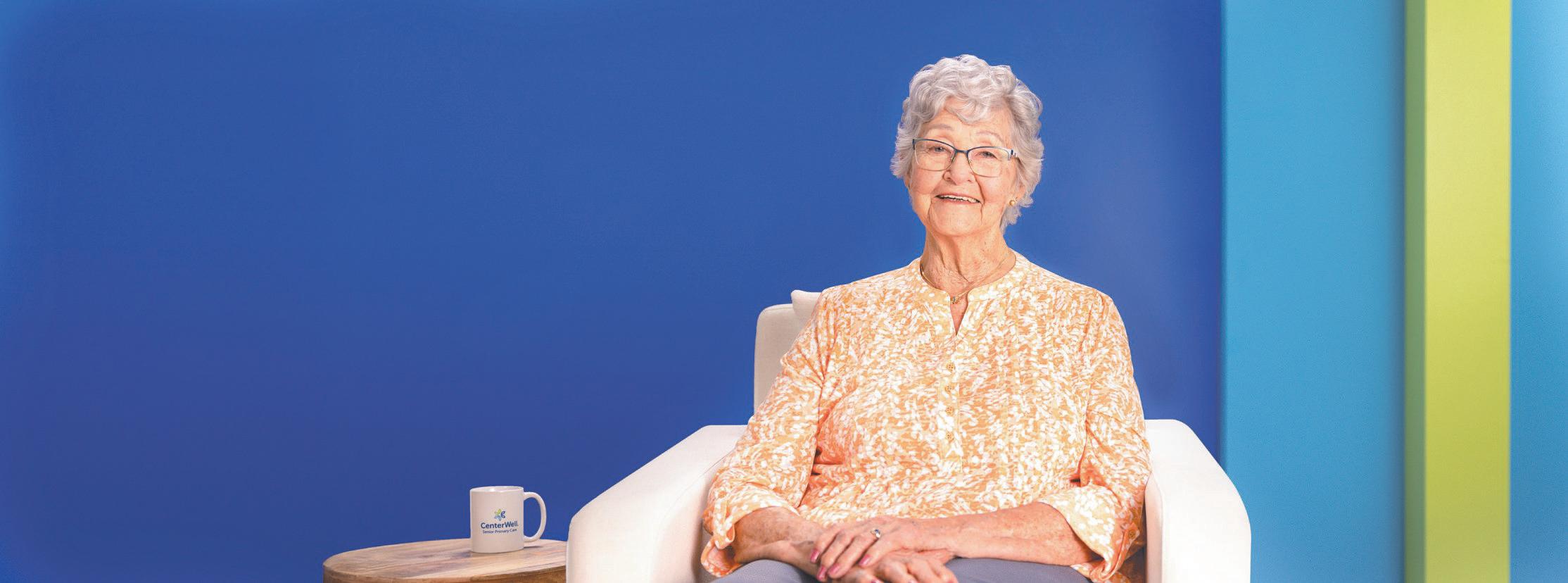Legacy in motion
For the inaugural Louisiana Inspired ENCORE Awards, seven Louisianans over the age of 60 are being honored for their continued leadership, service to others, innovativeness and the ways they inspire young and old.
Over the summer, readers across the state submitted nominations, highlighting neighbors, friends, family and mentors who hadn’t slowed down people still doing meaningful work, still learning, still giving.
A review panel considered each nominee using a rubric focused on community impact, innovation and service.
The result? Seven individuals whose lives remind us that growing older doesn’t mean stepping back. Narrowing the field of nominees to seven was a challenge. In the newsroom, the exercise of learning so much about so many was
Encore Awards honor seven Louisianans who prove purpose doesn’t retire
inspiring The big takeaway: For many, purpose and passion don’t fade. They expand.
The honorees are launching new projects, creating art, building things, mentoring others and teaching important skills. These people continue to take on fresh challenges, proving that second and third acts can be just as rich and rewarding as the first. In short, they continue to show up.
The ENCORE Awards aim to shine a light on those who defy outdated ideas of aging — and in doing so, lift up the rest of us. These seven are reminders that curiosity doesn’t retire, and service doesn’t have an expiration date.
Each honoree will be profiled in Louisiana Inspired this week and next, with stories that explore the work they’ve done and the lives they continue to touch
The 2025 ENCORE Award winners are:
n Carol Fleischman, New Orleans
n Eldridge (Butch) Gendron, St.Amant
n Sally Hebert, Lafayette
n Sal LaRock, New Orleans
n Judge Calvin Johnson, New Orleans
n Lois Kuyper-Rushing, Baton Rouge
n Shelley Thomas, New Orleans



Rules for better conversation
Not long ago, I was reminded of an old episode of “This American Life” one I’ve returned to more than once since it originally aired in 2013. In it, Sarah Koenig, the episode’s producer, shares her mother’s “seven rules of conversation.” Her mother, Maria Matthiessen, admittedly broke her own rules on occasion and was generally forgiving with others, but she reminded her family of the rules on a regular basis.
Matthiessen didn’t invent the list. She learned the rules from a French friend which in Louisiana, makes the list feel even more official.
The reasoning behind the rules of conversation, according to Matthiessen, is that, “Nobody cares” about these specific topics.
The topics aren’t what you might expect not politics, religion, or death. Instead, they’re the everyday things many of us bring up without thinking. To each one, Matthiessen has the same reply: “Nobody cares.”
How you slept? Your dreams? Your money? Your diet? Your health?
“Nobody cares,” says Matthiessen. According to the episode, Matthiessen takes the list seriously and added two items to the original list — health and route talk (explaining which roads one took to get somewhere and that someone cut him off on the exit or that such and such road was closed, etc.).
Clearly, I loved the episode — 12 years later, I’m still talking, thinking, and writing about it, partly because the idea of a mother admitting she didn’t care about something felt so revolutionary to me. Certainly, I could not imagine my mother saying any of this.
At one point, her daughter asks, “Wait, when I call you and I’m sick, are you saying you don’t care?” Her mother explains that if she’s seriously ill, of course, she cares, but minor aches and pains? Not so much.
My own mother, to this day, hangs on every word her children say I do not take this kind of love and listening for granted Even with our children now young adults, I still find myself striving to be more like her
But every now and then, Matthiessen breaks into my brain — especially when route talk starts, her No. 1 conversational no-no.
BY LAUREN CHERAMIE Staff writer
Carol Fleischman did it big for her 90th birthday As she should.
She requested a global theme, from food down to decor with the Bruce Daigrepont Cajun Band as entertainment at the Deutsches Haus in New Orleans. Her friends and family followed tradition and brought pies for the celebration. Pies have been Fleischman’s go-to for her children’s birthday parties since she never liked making cakes.
“I did my 90th birthday in grand style,” Fleischman said, “and people said, ‘Oh, well, invite us to the 100th.’ And I said, No, it’s one year at a time and one day at a time.’ I did not plan to have any more big celebrations. I think we did it well enough.”
While the nonagenarian aptly celebrated her birthday, she’s mostly used to celebrating other people’s lives as a certified life coach who helps individuals positively recall and live their lives More than 200 people have participated in her Cycles of Life Legacy program, which includes a five-step process of recalling and recording life memories in seven-year cycles in groups of 6 to
12 people. The approach is based on the 7-year cycle theory, which suggests that significant life changes tend to occur in seven-year intervals.
Participants leave the program with a written statement that illuminates the significance of their lives.
“People go away with a story that tells what their great strengths and qualities are and also what contributions they have made to the world,” Fleischman said.
Susan Burge who nominated Fleischman for the Louisiana Inspired Encore Awards, wrote that Fleischman’s No. 1 goal is to help others become optimistic.
“She often asks, ‘What if everyone in the world operated out of what is good in their lives?,’” Burge wrote. “Certainly, for anyone of any age, being impacted by major change(s) and adjusting to new living circumstances of any kind, recalling the ‘best of times’ and living out of positivity, which is the core of Carol’s program, has proven to be a powerful, positive practice.”

to be, by all accounts, a force to be reckoned with. In her quest to help people positively age, she has done the same. She says that the key to aging well is to “do it with a positive attitude, knowing that there’s hope and possibility in every
Even Robert Redford — yes, that Robert Redford — wasn’t exempt. In the episode, Koenig and Matthiessen review the list and even tell about the time Robert Redford drove to their home for a visit. Shortly after his arrival, he did the unthinkable. He told them about his drive to Long Island from Manhattan.
He got lost. He got a ticket. Someone recognized him.
Matthiessen said the drive takes two hours and that Redford practically took two hours to tell the story
“Was he dead to you after that?” Koenig asked
“Pretty much,” her mother replied.
Perhaps this old radio episode has remained top of mind because our family has had a chronic route talk violator Now that our children live in different states and time zones, we often catch up on the phone during commutes.
With one particular family member, we often get a detailed, playby-play account of her drive home.
Thanks to Matthiessen’s rules, gentle route talk reminders have given
ASK THE EXPERTS
Former educator is staying busy giving back
2025 ENCORE WINNER
to the future You’ve got to make sure you get what you want. I got to take care of my grandkids. What do you do in the Superdome? What does that look like?
I am in charge of the press box.
Q&A WITH SAL LAROCK RETIRED PHYSICAL EDUCATION COACH
BY COURTNEY LUCIUS Staff writer
Amite native Sal Larock has served his community as an educator, volunteer, gardener and more for decades. Starting in Jefferson Parish schools as a physical education coach, Larock spent over 40 years working in Jefferson Parish schools as a teacher, principal, operations manager and director of community education.
Post-retirement, Larock remains active with the Caesars Superdome, is the sole caretaker of the 250 “knockout” rose bushes at Lafreniere Park and works with Concord Shore Services as the voice welcoming people on Carnival Cruise Lines and aiding people in wheelchairs. As a member of Dawn Busters Kiwanis Club, Larock volunteers with the Rewards for Reading program and created the mascot, Rocky the Rooster, to bring to presentations.
Larock has continued to serve, lead and inspire his community, turning his passions into opportunities to help people around him.
This interview has been edited for length and clarity
How do you define a Renaissance man?
Was it your goal to be one?
A Renaissance man has pride, passion and proper purpose giving back. You want to give back because there are so many opportunities because seniors don’t take advantage of things. I can show you where a lot of friends drink coffee in a coffee shop all morning talking about the past. Look at me, I’m talking about the future. We’re looking
I have 18 people working for me. We’re the top people here. You know, walking on the deck up in the press box, and they come up and do their work.
It’s a working environment. No loud talking, no drinking, no nothing. You got to have credentials to get up to us As they come in, they’ll go ‘Hey Mr Sal!,’ and it’s so much fun. When they first got started I helped them out, and now we’re 10 to 20 years into it. They’re very successful, and I still get to watch them grow.
You’re the voice of the cruise line. How did that happen?
Networking got me to Carnival, and at Carnival I was just working different positions computer positions and then a position came up of the announcer. When it came up about the announcer, I took it. Guess what? I developed it
Then I saw a lot of senior people, and I’m talking them, and I saw our young people pushing to help them
So I said, let me try that. So that’s how I got the announcer position, and that’s how I got the wheelchair position, and that’s how I will continue to make a difference for however long.
As chair of Dawn Buster’s adopt-a-garden program and caretaker of Lafreneire Park’s knockout rose bushes, where does your passion for gardening come from?
I grew up in a very, very small town in a poverty situation, and we were strawberry farmers. We made farming our living. What we ate is what we grew, and so, my innate ability is to farm. When I came to the city and I started teaching, I would always go back to the country continually Why knockout roses?

Knockout roses are drought resistant. They’ll bloom maybe two, maybe three times a year I don’t have to, like other roses, baby them as much. When a drought is bad, I’ve got a big tank I put in the back of my truck. And I go around, and I water them to keep them going. Do you think that gardening strengthens the community?
Gardening strengthens community because it brings the community together on a common cause. It creates an environment of tranquility They come, sit on the benches, and they talk about it, reaping men-
tal and social benefits.
The color designs is aesthetic.
On a personal level, they visit to recall their positive childhood It strengthens community because it gives those in their community an opportunity to come to the park and reap the rewards of all the benefits.
How have you found different ways to strengthen community?
In a nutshell, if you network, you stay active, you stay in the flow, things will come to you — if you have a vision of what you want to do, you’re motivated and you have integrity, integrity doing the right
thing for the right reason.
Why have you continued to work with children in Dawn Busters Kiwanis? How have you seen these programs benefit kids over time?
During my education career, I was deeply involved in Kiwanis. The whole time I was involved with Kiwanis, I always had the belief of making a difference in my community So, the answer to that question is, education continued for me after I retired because Kiwanis allowed me to continue nonprofit community involvement. Community involvement is the nature of the game.


added that taking care of yourself is important as well. Through the trials and tribulations of her life, Fleischman’s daughter Laurie Kramer, says her mother has always kept her positive attitude.
“As a child, it was always, ‘The future is open. The past is forgiven. Today is good.’
That was kind of my mom’s mantra,” Kramer said.
Fleischman grew up on a farm in Wisconsin and attended a one-room schoolhouse with eight grade levels in the same space.
“By the time you graduated, you learned things eight times,” she said.
As a child, her favorite thing to do was read the National Geographic magazines that were stored in her house. This practice inspired a lifelong love of travel.
But it wasn’t until her 40s that she traveled out of the United States for the first time. She parted ways with her husband and was the mother to a son and two daughters. At 45 years old, Fleischman attended Case Western University in Cleveland, Ohio, to participate in an external degree program for two years. In 1978, she joined the Institute of Cultural Affairs and worked on community development projects in rural communities in India and Indonesia. To date, she has traveled to Italy, Greece, Portugal, Chile, Argentina, Ireland, Germany, Mexico, Costa Rica, New Zealand, Australia, France and Hungary
RISHER
Continued from page 1G
her driving and get off the phone.
Travel, she says, taught her how to tune in to people, even if she couldn’t speak the language.
“Every human being is unique,” she said.
Cycles of Life Legacy
In 1981, Fleischman landed in New Orleans and worked at the Belle Chasse State School for two and a half years. Though not a native New Orleanian, Kramer says that her mother feels like she belongs in the Crescent City Fleischman went to work at LSU Medical Center in the Department of Rehabilitation Counseling as a trainer and program developer in 1984. After LSU, she did strategic planning with Trinity Episcopal Church, the NO-AIDS Task Force and other clients. In 1994, she became a certified life coach with Success Unlimited Network, a global school that is accredited by the International Coaching Federation. Today Fleischman facilitates retirement coaching, group and individual coaching and vocation transition, along with her Cycles of Life Legacy program, across Louisiana. While the legacy program is open to anyone, the primary focus is on people who are experiencing the second half of life (age 50 and beyond).
“She’s trying to impart to other people, ‘Stop looking at your life as a series of mistakes and successes. Everything you go through has meaning, is purposeful and can be looked at positively,’ Kramer said. “She’s got the story to back it up. She proves that you can do this.”
‘I want it to last’
When Patricia Sharpe attended one of Fleischman’s
At this point, our daily Denver traffic updates are part of our family lore. We gripe. We roll our eyes — but, like my mother, we still listen.
courses at her church, she was estranged from her younger brother She recounted the first seven years of her life with a partner in the group, and she had the opportunity to open up and talk about the impact of her childhood. After the program, she was able to find and meet her brother who she hadn’t seen since he was 3 years old.
“I would not have been able to handle meeting him had I not done that process,” Sharpe said. “And I was able to share the way I felt with him.”
She added that Fleischman’s program allowed her to look at the first seven years of her life with a new perspective.
“It was life-changing for me to go through her process,” Sharpe said.
In the future, Fleischman hopes to train and certify more people in the Cycles of Life Legacy process. A cadre of her colleagues is currently working to prepare the program and facilitators’ guide for copyright and publication.
“I have documented the process, and I need to get it out there and get it valued,” Fleischman said “Because I want it to last.”
Through her years of facilitating people through life transitions, Fleischman says that people are really surprised at the value of their contributions.
“A lot of people live their life and just plod on, or dance, whatever style is theirs, and don’t really realize the significance of what has already happened,” she said.
“And I think (documenting it) just adds great power and strength to going forward, no matter what age you are.”
I find a certain beauty in rules like Matthiessen’s — not because they’re rigid, but because they force us to think about and pay more attention to what fills our heads and what words come out of our mouths. Maybe that’s the deeper truth behind Matthiessen’s rules. When we strip away the filler what’s left might be real connection — conversation that stays and reminds us to say the important things and not just what pops in our heads.
Email Jan Risher at jan. risher@theadvocate.com


Acadian is the onlyambulance service in Louisiana to holdaccreditations from both the Commission on Accreditation of Ambulance Services and the Commission on Accreditation of MedicalTransport Systems, our industry’smost stringentaccreditation agencies.
Thatmeans Acadian exceeds thegoldstandardin EMStraining, equipment, protocols and medics


